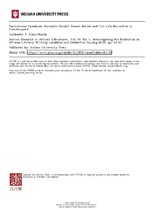Postnational paradoxes: Nuruddin Farah's recent novels and two life narratives in counterpoint
| dc.contributor.author | Moolla, Fiona. F | |
| dc.date.accessioned | 2022-01-28T07:43:28Z | |
| dc.date.available | 2022-01-28T07:43:28Z | |
| dc.date.issued | 2018 | |
| dc.identifier.citation | Moolla, F. F. (2018). Postnational paradoxes: Nuruddin Farah's recent novels and two life narratives in counterpoint. Research in African Literatures , 49(1). 63-83 | en_US |
| dc.identifier.issn | 1527-2044 | |
| dc.identifier.uri | https://www.jstor.org/stable/10.2979/reseafrilite.49.1.05 | |
| dc.identifier.uri | http://hdl.handle.net/10566/7138 | |
| dc.description.abstract | Nuruddin Farah’s most recent novel, Hiding in Plain Sight, provides an interesting fictional terrain within which to explore postcolonial postnationalism. This novel highlights the impacts of globalization and transnationalism on subject formation, personal and family relations, and opens up questions of sexuality in a postnational context. Connections between individual subject and nation formation have been considered across Farah’s career beginning with his first novel, From a Crooked Rib, that marked the double emergence of the autonomous individual and the nationstate, to, most notably, Maps, which completely deconstructs the “mythical” foundations of the Somali nation. Hiding in Plain Sight presents an idealized, postnational cosmopolitanism with no apparent collective affiliation that is presented as the automatic outcome of constitutive hybridity and global hyper-mobility. | en_US |
| dc.language.iso | en | en_US |
| dc.publisher | Indiana University Press | en_US |
| dc.subject | Nationalism | en_US |
| dc.subject | Postnationalism | en_US |
| dc.subject | Sexuality | en_US |
| dc.subject | Diaspora | en_US |
| dc.subject | Globalization | en_US |
| dc.title | Postnational paradoxes: Nuruddin Farah's recent novels and two life narratives in counterpoint | en_US |
| dc.type | Article | en_US |

